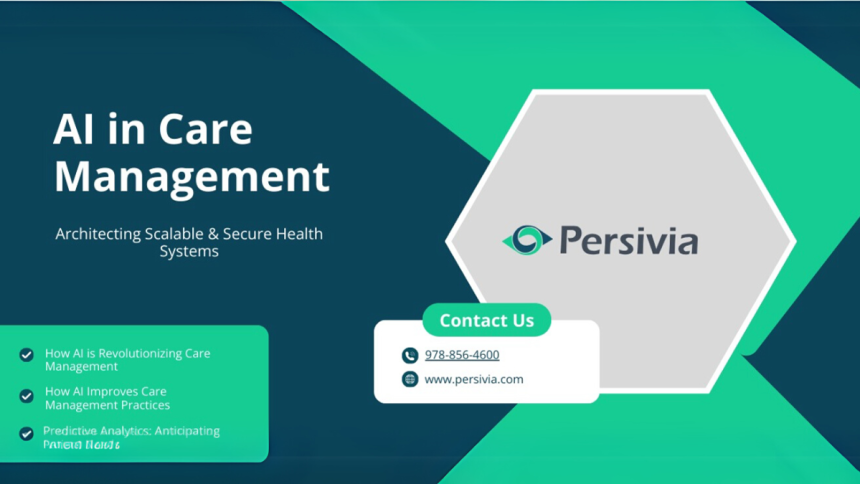Healthcare organizations today are under tremendous pressure to minimize costs while meeting the growing demand from patients. AI in Care Management has become a game-changing tactic in this quickly evolving world. By facilitating automated procedures, personalized care plans, and predictive analytics, artificial intelligence (AI) in care management systems has the potential to revolutionize healthcare delivery. But there are obstacles in the way. To lower the risks related to bias, data security, and system reliability, integrating AI requires thorough research.
How AI is Revolutionizing Care Management
AI in care management is not simply a passing trend; it is redefining the way healthcare organizations work. AI-powered solutions enhance patient outcomes and operational efficiency by automating time-consuming processes and analyzing huge volumes of medical data. However, success requires careful implementation. Let us look at how AI is altering the game.
How AI Improves Care Management Practices
AI technology dramatically improves care management methods by allowing for tailored treatment, optimizing resource allocation, and increasing patient participation. The following are the primary reasons that AI is beneficial:
- Improved Coordination of Care: AI systems integrate information from several sources to enhance care teams’ ability to communicate with one another.
- Specialized Care Programs: AI creates dynamic treatment regimens that adapt in real-time based on the unique needs of each patient.
- Risk stratification: To provide prompt care, algorithms determine which patients are more likely to require hospitalization.
- Workflow Optimization: By automating routine tasks, healthcare personnel may focus on patient-centered activities.
- Data-driven insights: AI identifies trends and patterns in patient data, enabling better-informed healthcare decisions.
Predictive Analytics: Anticipating Patient Needs
Predictive analytics is one of the most common applications of AI in care management programs. AI detects possible health hazards and allows for early action by utilizing large datasets. This is how it makes a difference.
- Reduced emergency visits: Algorithms with AI capabilities can predict high-risk patients, allowing for preventive care that reduces hospital stays and costs.
- Data Driven Decisions: Healthcare professionals may make better judgments using real-time information, which raises the standard of care overall.
- Managing chronic conditions: By identifying minor health changes, ongoing monitoring enables timely treatment plan adjustments.
Automating Routine Tasks: Reducing Administrative Burdens
Administrative tasks sometimes overburden healthcare workers. Automating these with AI in care management programs dramatically saves the burden, allowing physicians to devote more time to patient care.
- Efficient Data Entry and Recordkeeping: Automatic collection and updating of patient data decreases errors and administrative effort.
- Appointment scheduling: Automated systems manage bookings and follow-ups seamlessly.
- Claim Processing: AI-driven validation speeds up insurance claims while reducing manual labor and errors.
| Benefit | Impact |
| Predictive Analytics | Proactive care and reduced emergency visits |
| Automated Admin Tasks | Saves time, reduces manual errors |
| Personalized Care Plans | Improves accuracy and patient engagement |
| Data-Driven Decision Making | Supports precision in patient management |
| Risk Stratification | Identify high-risk patients for early intervention |
Challenges and Risks: Addressing Real-World Issues
While the potential for AI in care management is clear, there are certain challenges. The route to effective integration is laden with obstacles that might risk patient safety and data integrity.
Data Privacy: Protecting Sensitive Information
Because data privacy is so important in healthcare, AI-based care management systems must prioritize strong security measures. Because of the sheer volume of data handled, breaches are more likely to occur, which can have serious financial and legal repercussions. It is essential to adhere to regulations such as HIPAA while utilizing state-of-the-art encryption technologies.
Algorithmic Bias: Ensure Fair and Equitable Care
Inadvertently reinforcing healthcare disparities by training AI systems on biased data could risk patient care by favoring one group over another. To overcome this, developers must prioritize developing balanced training datasets and regularly reviewing algorithms for fairness.
System failures: Reducing downtime and disruptions
Without adequate oversight, an over-reliance on AI technology might lead to malfunctions that interfere with the provision of healthcare. Reducing downtime and preserving constant care quality need routine testing and backup strategies.
Methods for Integrating AI in a Safe and Effective Way
To guarantee the efficacy and safety of AI in care management, healthcare practitioners have to use the following best practices:
- Constant Observation: Conduct routine audits of AI systems to find and fix biases or errors.
- Improved Data Security: To protect patient data, use secure data storage and robust encryption.
- Human Verification: To prevent mistakes, combine expert judgment with AI-driven insights.
- Employee Education: Inform healthcare professionals on the benefits and drawbacks of AI technologies.
The Next Thing in AI-Powered Care Management
The demand for more effective and precise healthcare delivery is pushing the deployment of AI in care management programs; nevertheless, the objective should be to employ AI to improve rather than replace human knowledge. Reducing risks and gaining benefits need careful and responsible integration.
Persivia CareSpace® is Leading the Way in AI-Driven Care Management
With its innovative CareSpace® technology, Persivia is leading the way in integrating AI into care management. This all-inclusive solution combines real-time analytics with patient-centered care, providing accurate insights while ensuring data security and compliance. Physicians can provide better, data-driven care while ensuring patient safety. CareSpace® uses reliable AI technology to assist healthcare workers in making informed decisions, from automated care planning to real-time risk assessment. Persivia raises the bar for appropriate AI integration in healthcare by combining innovation and pragmatism.
Bottom Line
Adopting AI in care management calls for safe use in addition to embracing new technologies. The risks and perks are enormous. Healthcare businesses may fulfill AI’s transformational potential while preserving patient confidence and treatment quality by following best practices, maintaining openness, and stressing human oversight.
Lynn Martelli is an editor at Readability. She received her MFA in Creative Writing from Antioch University and has worked as an editor for over 10 years. Lynn has edited a wide variety of books, including fiction, non-fiction, memoirs, and more. In her free time, Lynn enjoys reading, writing, and spending time with her family and friends.















